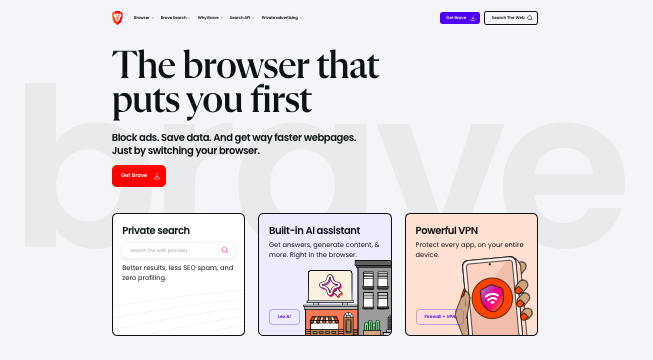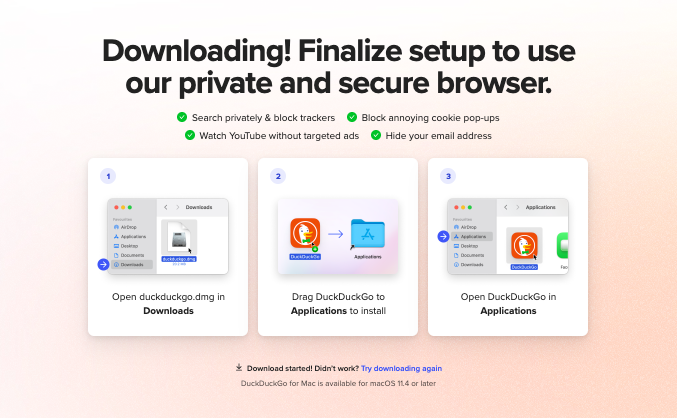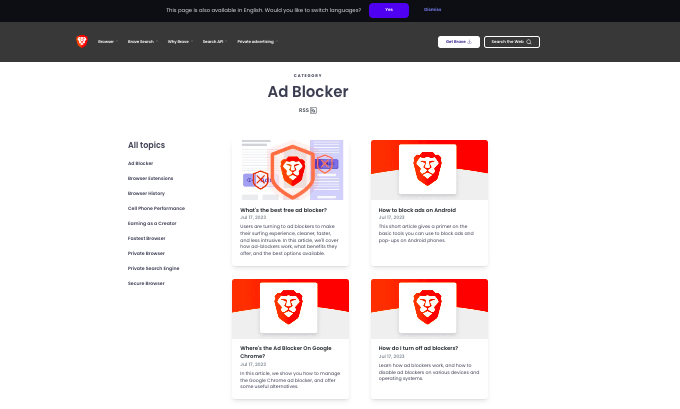In recent years, privacy-focused browsers like Brave and DuckDuckGo have gained popularity as individuals become increasingly concerned about online privacy and data security.
These alternatives to mainstream browsers aim to provide a secure web browsing experience by minimizing data collection and empowering users to control their digital footprints.
As awareness surrounding online tracking continues to rise, the choice of a browser plays a crucial role in safeguarding personal information.
This article will delve into a thorough review of Brave and DuckDuckGo, examining their unique attributes, user experiences, and how effectively they uphold your right to privacy online.
Read on.
Brave

Brave, launched by Brendan Eich, has gained attention for its innovative approach to web browsing. The open-source platform is created on the principles of speed, privacy, and user autonomy.
Built on C++, Swift, and JavaScript, the tool prioritizes an efficient user experience while offering a glimpse into its underlying code through public accessibility.
Brave features include a built-in ad and tracker blocker, enhancing browsing speed and reducing data consumption.
Major news sites reportedly load up to six times faster than on traditional browsers like Chrome and Firefox.
Brave rewards users with Basic Attention Tokens (BAT) for engaging with privacy-respecting ads, fostering a unique advertising model that challenges conventional practices.
Brave users enjoy lower memory usage per tab compared to other popular browsers, consolidating its position as a highly efficient choice in the marketplace.
Also Read: Best Firefox Based Browsers
Privacy and Security Measures
Brave privacy features set it apart in a crowded field by blocking invasive trackers and ads, ensuring your data remains protected.
The browser enforces encrypted HTTPS connections as default, and offers functionalities like Tor browsing for enhanced anonymity.
With less potential for data leakage, users can rest assured that their private browsing history stays just that private.
Beyond protection against traditional threats, Brave security measures include script blocking and comprehensive cookie management, guarding sensitive information from potential misuse.
Unique Features of Brave
Brave unique features contribute significantly to its appeal. The integrated secure crypto wallet allows for easy management of tokens and NFTs within the browser.
Furthermore, the introduction of Brave Search as the default engine provides a privacy-centered alternative to mainstream search engines, ensuring that user searches are not tracked or sold.
The browser also offers capabilities such as data syncing across devices and the ability to interact with Brave Leo, an AI assistant designed to protect user privacy while providing useful services.
All these aspects reinforce Brave as a frontrunner in the realm of privacy-focused web browsers.
Also Read: Best Free Blocksite Alternatives
DuckDuckGo
DuckDuckGo, founded in 2008 by Gabriel Weinberg, is rooted in providing a privacy-focused search engine.
The purpose of DuckDuckGo extends beyond mere search functionalities to include a browser that prioritizes user security and anonymity while navigating the web.
Origins and Purpose of DuckDuckGo
As a response to the increasing concerns over online privacy, DuckDuckGo’s purpose revolves around minimizing data collection.
The approach ensures users can browse without being tracked by advertisers and data brokers. The browser operates on the principle that individuals have a right to privacy in their online activities, making it distinct among other tools.
Privacy Features of DuckDuckGo
DuckDuckGo privacy features include blocking trackers at the source and enforcing encrypted HTTPS connections. This enhances security and protects users from potential data breaches.
Additionally, the browser automatically ranks site privacy policies, providing you with insights into how your data may be handled by various websites.
Its design avoids the pitfalls of extensive DuckDuckGo data collection, ensuring your browsing habits remain private.
Such facets significantly contribute to the appeal of DuckDuckGo, making it a preferred choice for users who value anonymity.
Limitations of DuckDuckGo
Despite its strengths, DuckDuckGo has certain limitations.
DuckDuckGo lacks features that provide robust protections against malware and viruses.
Some users feel that while the browser excels in privacy, it does not match the comprehensive security offerings available in other browsers.
It serves non-personalized ads for revenue, lacking an advanced ad-blocking integration that some users may desire.
These limitations highlight the balance DuckDuckGo strikes between maintaining privacy and offering a fully featured browsing experience.
Ad Blocking Capabilities
Brave
Brave features a robust built-in ad blocker that eliminates unwanted advertisements. The integration leads to reduced data usage and enhances browsing speeds remarkably.
The Brave ad handling system blocks intrusive ads automatically, offering a seamless experience without necessitating manual adjustments.
Users enjoy smoother navigation as the Brave ad blocker actively shields them from interruptions, creating an optimized browsing environment.
DuckDuckGo
DuckDuckGo adopts a different approach to advertising.
While it allows DuckDuckGo ads, these are strictly non-personalized and based on contextual relevance rather than your browsing behavior.
DuckDuckGo focuses on privacy by ensuring that its advertising practices do not involve tracking user activity.
Although it does not provide built-in ad blocking, the browser effectively blocks third-party trackers and advertising methods that compromise privacy.
By preventing ad tracking, it minimizes the exposure to intrusive advertising while still allowing contextually relevant ads to appear.
Privacy Protection
Data Collection Policies
Brave takes a robust stance against invasive Brave data collection, ensuring users’ browsing behavior remains completely anonymous.
The browser’s architecture is built with privacy at the forefront, with a policy that allows no collection of personal information.
DuckDuckGo data policies echo this commitment, as the platform refrains from storing any personally identifiable information (PII).
Both browsers emphasize a user-first approach, affirming that your online activities are your own.
Tracking and Cookies Handling
Privacy enhancement continues with Brave tracking practices.
The browser not only blocks third-party tracking cookies by default but also incorporates features to manage aggressive tracking behaviors effectively.
In comparison, DuckDuckGo excels in minimizing cookie usage with its DuckDuckGo cookie handling techniques which include blocking third-party trackers and restricting first-party cookies.
The browser automatically clears browsing data, ensuring your privacy is preserved after each session.
Both browsers effectively defend against unwanted tracking, reinforcing their reputations as leaders in privacy-focused browsing.
Speed & Performance
Brave
The Brave browser stands out for its impressive speed.
Its aggressive ad and tracker blocking significantly reduces the amount of data that needs to be fetched from websites, which enhances the overall performance.
Although Brave’s loading times are slower compared to competitors like Safari and Opera GX, it retains an edge over DuckDuckGo in many scenarios.
Fast loading times contribute to user satisfaction and can be a deciding factor for users seeking efficient browsing solutions.
Implementing improvements in loading sequence could further elevate Brave browser speed and drive user retention.
DuckDuckGo
DuckDuckGo performs adequately across multiple platforms, including Windows, MacOS, and mobile devices.
While it provides privacy-focused browsing, there are instances when its reliance on external sources for ad-blocking can lead to slower load times compared to Brave.
The performance analysis reveals that DuckDuckGo’s capability to handle cross-platform usability is commendable, though not without its limitations.
Users find the browsing experience slightly sluggish at times, which underscores the importance of browser speed in retaining an audience.
Brave
As Netflix and Spotify have transformed media consumption, Brave is making waves in the web browsing arena.
With a focus on privacy-centric features, the Brave user base is witnessing steady growth. Its appeal now resonates with a demographic increasingly concerned about online privacy.
This growing interest in Brave emphasizes a broader awareness of digital privacy issues. As traditional browsers dominate the market, Brave’s emphasis on user privacy and decentralized operations attract attention.
While its market share remains modest at nearly 1%, the rising number of users demonstrates the effectiveness of its unique offerings, fostering a community eager to protect its online activities.
DuckDuckGo
DuckDuckGo’s market share has seen a downward trend in the last couple of years.
As per Statista, it stood at 0.71% in 2022, which has now dropped to 0.54%.
Though these humble numbers don’t indicate a heavy user-base but the two platforms still remain at the forefront of privacy-focused browsing tools.
Platforms & Compatibility
Brave
Brave browser compatibility spans multiple operating systems, including Windows, macOS, Android, and iOS.
The diversity in Brave platforms means users can maintain their privacy and security features across devices.
With strong fingerprint tracking protection and the unique ability to earn cryptocurrency while browsing, Brave proves to be a robust option for those seeking privacy-focused solutions.
DuckDuckGo
DuckDuckGo platforms include Android, iOS, Windows, and even Linux, making it a versatile choice for users who prioritize privacy in their web searches.
The browser, built on Chromium, ensures a user-friendly experience across these platforms while delivering outstanding features such as a cleanliness score of 90%.
DuckDuckGo compatibility with various systems highlights its commitment to user privacy, offering tools like tracker blocking and automatic conversion of HTTP connections to HTTPS, enhancing security across all devices.
Future Outlook
Both Brave and DuckDuckGo are poised for significant advancements.
Each browser is navigating its path to enhance user experience while prioritizing privacy and security.
Brave
Brave future developments are characterized by a strong focus on integrating cryptocurrency features, support for NFTs, and superior privacy tools, highlighted through their Brave upcoming features.
The browser plans to introduce several Brave upcoming features, emphasizing user privacy and new technologies.
With functionalities like advanced ad-blocking and enhanced tracking protection, Brave aims to solidify its position in the privacy-focused market.
These features not only improve page load speeds but also enhance users’ browsing experiences by reducing intrusive advertisements.
DuckDuckGo
DuckDuckGo faces unique challenges in maintaining its market share amidst a growing number of privacy-focused competitors.
With DuckDuckGo future challenges including the need to enhance search algorithm sophistication, the platform must continually adapt to shifts in user expectations.
Despite these obstacles, DuckDuckGo market positioning remains decent due to its commitment to safeguarding user data and delivering genuine privacy.
As they explore partnerships and potential feature enhancements, DuckDuckGo is set to reinforce its reputation as a reliable internet tool.
Conclusion
Choosing between Brave and DuckDuckGo largely depends on your browsing needs.
Consider Brave if you want a fast, feature-rich browser with emphasis on privacy and security.
However, if you prefer a simpler, private browsing experience without advanced features, DuckDuckGo is the ideal choice. Its search engine is equally secure and easy-to-use.
The best part is that both the browsers keep user-privacy on top.









